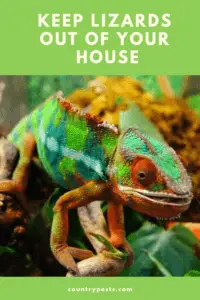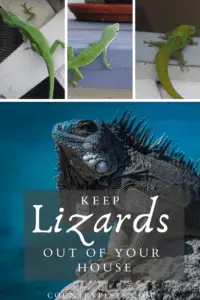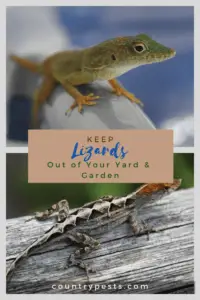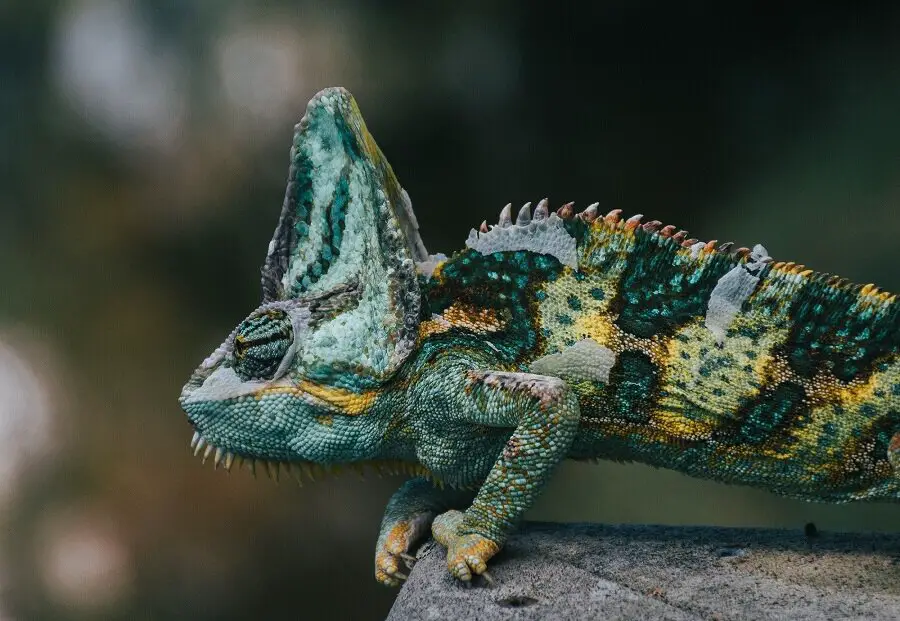Although lizards are nonaggressive reptiles, many people fear them or simply hate them. This is especially true when they invade your home, porch, or garden. How you handle a lizard problem will depend on whether you have a single lizard or two or whether you have a lizard infestation.
Lizards don’t generally want to invade your house, garage, or patio. But, cities and suburbs have grown and invaded much of their natural habitats. As a result, they have learned to live around people.
Keep lizards away from your home by removing food, water, and shelter that attracts them. Next, repel lizards through unattractive smells (to a lizard), an uncomfortable environment, and fear of natural predators. Lizards hate certain smells such as eggs, coffee beans, pepper, garlic, and onions. They also require warm temperatures so cooling your house can make it uncomfortable for them.
If you are facing uninvited lizard guests, there are a few more things you should do to make sure that the lizards stay away permanently.
How To Get Rid Of Lizards And Keep Them Away
The saying goes; “An ounce of prevention is worth a pound of cure.” This is true of lizards. Lizards are usually shy and reserved. They can become very comfortable with people and some varieties of lizards can actually be tamed very easily.
Although you don’t want lizards in your home or on your porch, lizards perform an important service. A single lizard can eat as many as a dozen bugs and insects a day. They also eat spiders and cockroaches. Killing the local lizard population can cause a noticeably larger insect and spider population.
So, it’s important to take steps that discourage, prevent and keep lizards away from specific areas instead of killing or harming them.
1. Remove The Lizard From Your Home
Occasional lizards can be removed from your home, while consistent, more frequent, and larger numbers of lizards should be dealt with on a more wide-scale basis. There are a number of ways that you can remove a lizard from your house.
You can get someone, such a neighbor child to remove it for you. You can also push it along with a rolled up newspaper. You can catch it in a box and relocate it. Or you can don a pair of gloves and pick it up and move it out of the house.
2. Check For Additional Lizards
Lizards don’t usually seek attention so if you see one lizard, you may have more lizards in the area. They usually hide in the corners of the house or under shelves, junk, or paper piles.
There are several signs of a lizard population in your house.
- A scooting noise when you turn on the light when entering a room
- The sensation of movement in your peripheral vision
- Droppings that are black with a white tip
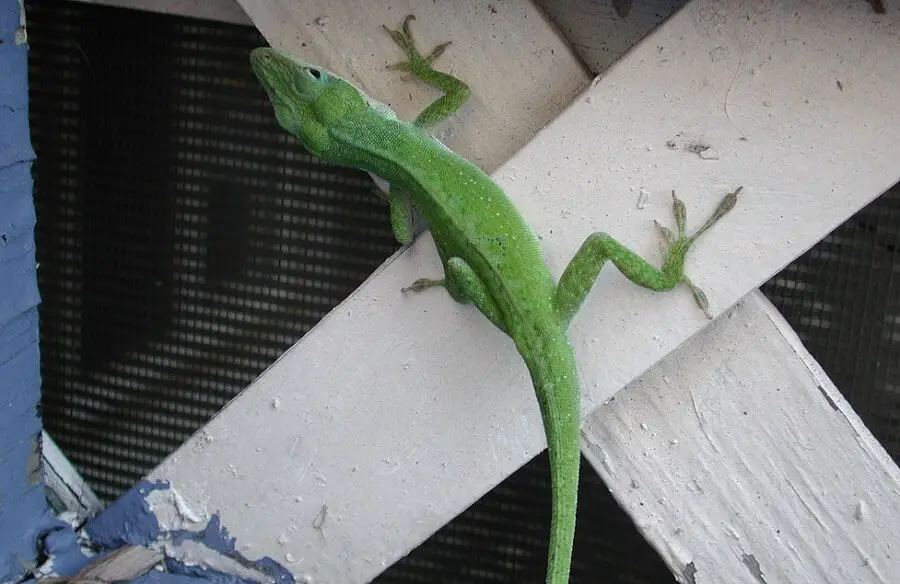
3. Take Control Of Your Bug Population
Lizards generally come into a house or make their home on a porch because they are following an easy food source. Spiders, flies, mosquitoes, cockroaches and other nasty bugs are all tasty meals to a lizard.
Some areas foster higher populations of insects such as wooded area, rivers, lakes, or old houses. That’s because there are lots of sources of food for bugs and many hiding places.
Take care to make your house uninviting to insects. Take care of the bugs and the lizards won’t be nearly as tempted to continue to enter your home. They will follow the food source and if the best food source is outside, they will stay outside.
4. Eliminate The Water Source
In addition to following a food source, many lizards will also follow a water source. They are usually desert animals and can survive long periods of time without water. But, that doesn’t mean that they prefer to go long periods without water.
Lizards have evolved to seek water for survival and they will stay close to a water source if they find it.
Inside your house, that can be standing water in the base of a potted plant, a pet’s dish, or condensation on a water cooler. Lizards will find an easy hiding place near the water so that they can drink whenever they need to.
Its survival for them.
Eliminating the water source helps to encourage them to leave.
5. Keep Your House Clean, Especially In the Corners
Houses with clutter, mess, or dirt are very likely to attract bugs and then lizards into them. Eliminate the hiding spots and the food attraction by keeping your house clean. Get rid of piles of magazines and newspapers. Clean the home office by going paperless and getting rid of the paper. Paper creates a great place for lizards to hide.
Trash, clutter, and other messes attract bugs, spiders, and cockroaches. Clean it up, throw it away, and eliminate all the places for these pests to hide. That will drastically help with your lizard problem.
This is one of the most important steps in keeping lizards out of your house.
6. Empty Kitchen Trash Cans And Keep Kitchen Sink Clean
Even clean families often have some dishes in the sink, but dirty dishes attract both lizards and bugs. The kitchen trash contains food scraps, lovers and other food for lizards. Although lizards love bugs, they can eat human food.
Most lizards are omnivores. That means that they can eat both meat and plants. That makes human food an acceptable meal to many lizards. (Not necessarily a healthy one if you have a lizard pet though.)
Take out your kitchen trash daily. Rinse your dishes and keep the kitchen sink clean. This will keep your sink dry as well as clean (eliminate food and water sources).
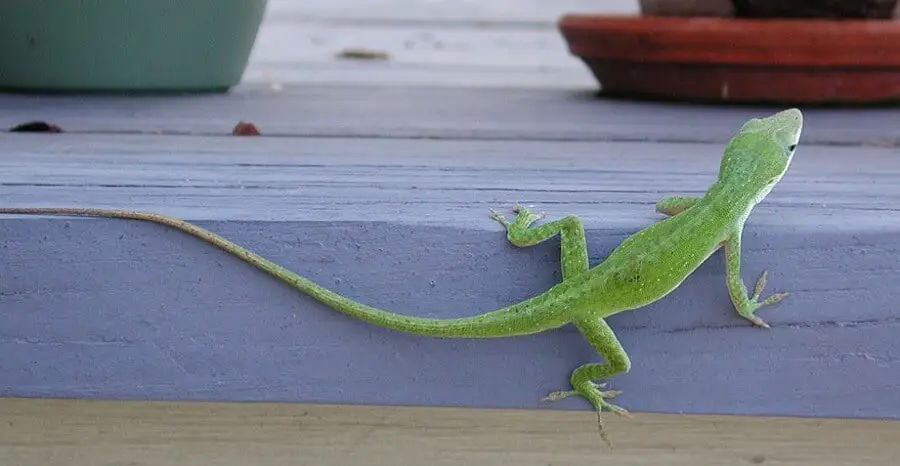
7. Sweep And Mop After Meals
Crumbs gather the most easily in the corners of the room and under the kitchen table. Take of it by sweeping the kitchen and dining room after every meal. If you have children or pets and there are spills of food, then mop after every meal.
Mopping will eliminate the smell residue left on floors and keep from attracting pests into the kitchen area.
Since the kitchen is usually the room in the house that people desire to keep lizards out of, this will make a big difference.
8. Use Screen Door And Keep The Door Shut
Lizards often enter a house through an open door. Keep the lizards out by shutting the door. In areas where that isn’t practical because cooling the house requires opening the doors, install a screen.
A screen door with a spring will close automatically when people leave. This allows a breeze to waft through the house while also keeping lizards and other unwanted pests outside.
9. Repair Holes, Gaps, and Cracks Around The House
Lizards can scale through small and narrow cracks in the wall. Even small gaps between a window sill and the wall is small enough for lizards to crawl through.
Keep lizards from easily entering by sealing all cracks in the walls and foundation of the house. Fix holes in the wall and under the eves of the house. If you have a stucco or wood exterior, lizards can climb the walls more easily. You will need to be aware of cracks higher in the walls and under the roof eaves of the house.
10. Replace Or Fix Screens On All Windows
Lizards often enter a house through open windows. Even many types of metal or older windows have gaps that allow lizards in. Check all your windows and make sure that they all have screens covering the windows.
Repair all screens that are loose have gaps, holes, or rips in the screen.
If the metal casing of the screen doesn’t fit the window or is bent, replace the entire screen. This will help to keep lizards out.
Add screens to other areas where an opening exists, but can’t be covered or filled. This can include places where utility pipes enter the house or swamp coolers that have vents on them.
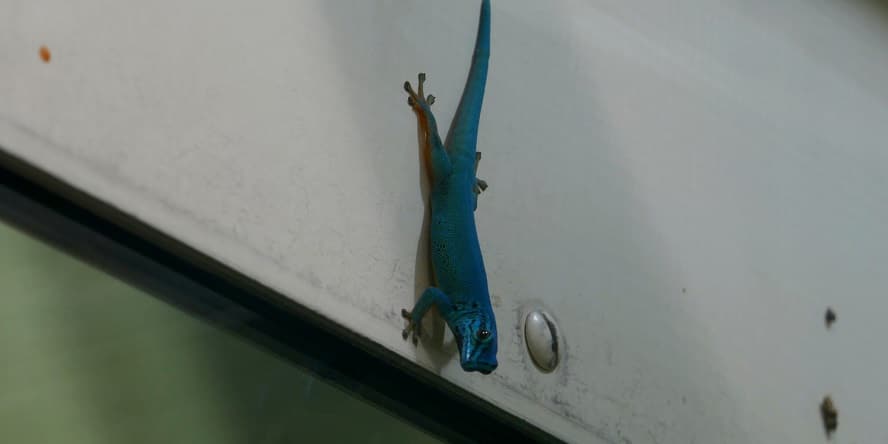
11. Turn Off The Lights At Nights
Lizards are the most active at night. During the day, they prefer to sun and warm themselves. Often lizards are attracted to lights. This may be because bugs congregate around a light at night.
Lizards are often attracted to the porch or deck because of a light. Lizards make their way into a house because it’s lit up.
You can keep lizards from hanging out around your porch and deck, or other doorways into your home by turning off the porch light at night when you head to bed. This will encourage them to move around for food. It stops the flies and mosquitoes from buzzing around the light and eliminates the easy feast.
Turn off the lights in you house that you aren’t occupying.
12. Cool Down The Temperature
Lizards are cold-blooded. They run the fastest and are the ablest to hide or hunt when they are warm. That’s one of the reasons lizards sun themselves. They need and like to stay warm.
Cooling your house down a few degrees can make your home more uninviting.
It will make the lizards more lethargic and if your house is cool enough compared to outside, it will make them much more likely to seek the warmth of your backyard instead of your house.
13. Sweep Your Porch, Windows, And Outside Areas
Just like you need to clean up your kitchen and other parts of your house, you can also keep lizards from congregating around the outside of your home. Lizards that live in your yard, around your trees, and garden do a lot of good. But if they also live close or against the outside of your house, it’s more likely that one or more of them will get into your home.
Sweep your deck area regularly. Sweep around light fixtures where bugs usually collect and often die. This is a big attraction for lizards.
Sweep your brown around window sills, door frames, and against junctions in your house. Forners where one wall meets another, or where your porch attaches to the house. Those little cracks and crevices are areas that often catch bugs and provide a great hiding place for the small reptiles.
14. Identify Problem Areas
If you have a recurring lizard population or areas where you continue to see them, take note. There might be cracks in that area of your house or something that is attracting the reptiles to that spot.
Take a look around and try to figure out and eliminate the reason lizards are coming. Eliminate the way they enter also.
You can add some lizard repellents to push lizards out of the area. This article covers several homemade repellents that are available in a lower section.
15. Check The Perimeter For Lizard Havens And Move Them
There might be specific spots around the outside of the house that attracts lizards. If these areas attract higher populations of lizards, then it is more likely that lizards will make their way into the house.
Walk around the house. Check for piles of things that lean against the house such woodpiles, trash, or rock piles. Porches or decks are another area to check out.
Bushes are another area that tend to attract lizards because it gives them a hiding spot and they can leave to bask in the sun.
Plus, bushes, woodpiles, and other areas with hiding spots tend to attract bugs. Bugs are the most common reason that lizards move into an area.
16. Replace Carpet With Tile
This option is more expensive and is something you will probably only consider if you are already replacing your flooring in the house. Consider tile instead of carpet. This is especially pertinent in areas that are warmer.
It keeps your floors, and house, cooler which can discourage lizards. It also eliminates the camouflage and hiding spots for small lizards. A clean tile floor is the most difficult place for a lizard to hide.
17. Get A Cat
Cats are natural hunters. Many cat owners sweat that their feline friend keeps lizards out of the house. However, be aware that some lizards are poisonous to dogs and cats.
Often having another animal in the house that is a predator to lizards helps to keep them away.
18. Get A Gecko
This sounds counter-intuitive, because you want lizards out of your house, but getting a gecko to run free can eliminate the rest of the population of other lizards and insects from your home. Geckos will eat and chase away other types of lizards, although if you really hate all lizards, a gecko is a larger variety to deal with.
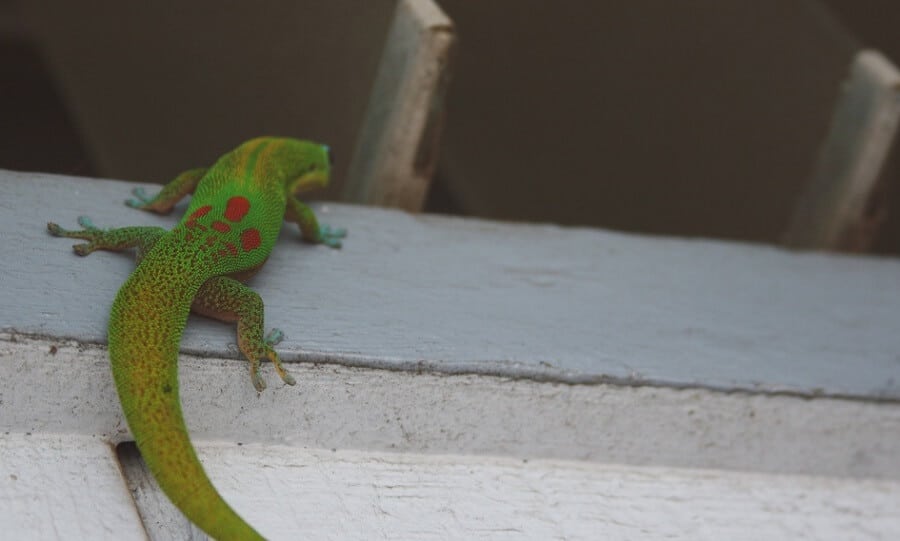
How To Remove A Lizard
Once a lizard has made it into your house, you will want to remove it. Killing the lizard isn’t usually recommended. First, many states protect several species of lizards. Even if you are confident you won’t get caught, consider the great benefits these lizards bring for them to be protected.
Lizards kill many insects and are not aggressive. There are only two types of lizards that are dangerous to humans. The Gila lizard and Mexican bearded lizard are only found in the Southern United States down to Brazil.
If you suspect one of these lizards has occupied your home, then you will want to use extra precautions in getting rid of it. Otherwise, there are several ways you can get rid of your reptile roommate.
Removing a Lizard From Your Home
- Spray it with cold water. Lizards will not be able to move quickly or dart away if they are sprayed with cold water because they are cold-blooded. The colder the water, the more effective it is. While the lizard is immobilized, remove it out of the house.
- Remove it with a bowl and cardboard. Cover the lizard with a bowl. Take a piece of paper or cardboard and slide it under the bowl. This traps the lizard in the bowl. Take the lizard outside and release it by uncovering the bowl.
- Get a neighborhood kid to come and get it out. Find a neighbor child who loves lizards to come to help you out. You will make a new friend and give the kid something to talk about. Plus they can learn a little more about local lizards!
- Be careful grabbing its tail. Most lizard tails can detach as a defense mechanism. It allows them to get away from predators. When you catch a lizard, it’s best to grab its body between the front and back legs. That will keep it from escaping and keep your fingers away from its mouth.
- Use a rolled-up newspaper to encourage it away. Push the lizard along using a rolled-up newspaper.
Home Remedies To Get Rid Of Lizards
If you have spotted lizards in your house and want to place some homemade repellents to keep them away, there are several effective options you can use. Most repellents rely either on a lizard’s sense of smell, or its sense of fear of specific predators.
1. Onions
Onions keep lizards away because they have a strong odor and will often repel other insects. Hang onions near the area where you have a lizard problem and monitor it for effectiveness. Onions lose effectiveness the farther away they are.
2. Garlic
Garlic will also produce a strong odor for lizards. Lizards tend to stay away from garlic, especially if they have a choice or place to go. If you want to keep lizards away from your port or patio, consider growing garlic in a container or small garden near your porch.
3. Pepper Spray
Use Pepper Spray to fight reptiles. Make your own by boiling cayenne or hot peppers in water. Use jalapenos and add onions or garlic to the water to make it effective. There isn’t a specific combination that works magic, many combinations work well to keep lizards away.
Just make sure the water boils for 20 minutes with a large number of peppers, onions, and garlic in the water. Strain it and spray in problem areas. It can also be applied on the deck or porch. The only problem with pepper spray is that it does leave a residue on your walls or floor if you use it in your house. I’ve preferred to use pepper spray around the outside of my house to repel lizards before they come inside!
4. Tabasco Sauce
I use Tabasco Sauce in the same way as pepper spray- around the outside of my house. Pepper spray is effective against lizards because it has a strong pepper scent and taste. However, it can be problematic and messy to smear tabasco sauce around your house. It’s probably best used outside. But, if you use it inside- I’d love to hear how it goes.
5. Peacock Feathers
Peacock feathers are frightening to lizards because peacocks eat lizards in abundance. The feathers are nature’s way of scaring away other animals and it works with lizards. It might be because the feather looks like an eye. Peacock feathers are not smelly or ugly so they are a good option.
The only challenge with peacock feathers is that they have to be placed where lizards can see them. Sometimes lizards occupy a hidden, dark corner of your house or cupboards so they may not see the peacock feathers.
6. Lemongrass or lemongrass essential oil
Lemongrass has a strong scent for lizards and can keep them away. But, it’s a more pleasant scent for people. Lizards tend to stay away from lemongrass and it’s a smell that doesn’t make your house smell funny. If you don’t have access to lemongrass, you can also use lemongrass tea bags. The strong scent usually deters lizards. Plus, the smell is usually more pleasant to people than egg shells, garlic or onions.
7. Coffee Grounds and Tobacco
Coffee grounds (or tobacco) are often used together or separately to repel lizards. Coffee has a strong distasteful scent to lizards that blocks their sense of smell or natural food. Tobacco is poisonous to most lizards and will kill them if they digest it. You can combine coffee and tobacco together to create a potent repellent. Leave in an area where lizard frequent.
8. Moth Balls
Naphthalene balls, also known as mothballs, are often used as a lizard repellent, but they are only slightly effective. They should be used in closed drawers and closets. Mothballs are not safe for pets or people. The amount that is needed in an open room is toxic and unsafe.
Be very cautious about trying mothballs or leaving them on the ground or around the house or yard. More than one furry pet has gotten ill or been injured after digesting a mothball.
9. Fly Paper Or Sticky Traps
You can use sticky traps to catch lizards. But, they can also be problematic around the house. Fly traps are sticky and can create a mess in the house. Although they are often suggested as a way to catch lizards, it’s a cruel way to catch them. And they also leave residue if laid flat where a lizard will cross. Sticky traps will catch lizards, but they will die a slow and painful death. They should be used as a very last resort.
10. Cold Water
Spray cold water on the lizard then remove it from the home. Be careful of documents and electronics when you do this.
11. Egg Shells
Sometimes eggshells deter lizards because they think that other animals occupy the space. Lizards don’t like the smell of eggs. Chickens and other large birds will usually eat lizards so they tend to stay away from egg shells.
However, egg shells can stink after a while and start to attract other pests, so, be thoughtful about where you use them. Raccoons, weasels, skunks, and dogs are often attracted to eggshells. Plus, egg shells can also attract snakes. I’ve never used this solution because I’ve faced issues with other predators before.
Natural Lizard Repellent Chart
| Natural Lizard Repellent | Ease of Use | Effectiveness | Cost |
| Onions | 5 Stars | 3 stars: Very effective in the immediate area, but less effective farther away | $1-2 |
| Garlic | 5 Stars` | 4 stars: More effective closer to the garlic | $1-2 |
| Pepper Spray | 4 Stars | 3 stars: Usually sprayed in area where the lizard is, but can can create some cleanliness issues | $1-2 |
| Tabasco Sauce | 3 Stars | 4 Stars | $2 |
| Egg Shells | 3 Stars | 3 Stars: can attract other animals and predators | Free |
| Peacock Feathers | 5 Stars | 3.5 Stars: must be visible to the lizards | $3-5 |
| Lemon Grass | 3 Stars Can be difficult to find | 3 Stars: Must be in the area lizards come in | $3-5 |
| Coffee Grounds | 5 Stars | 5 Stars | Free |
| Moth Balls | 3 Stars Can harm pets | 3.5 Stars | $5 |
| Fly Paper or Sticky Traps | 3 Stars | 2.5 Stars (Lizard must overcome the smell to crawl over them) | $5 |
| Cold Water | 2 Stars | 2.5 Stars (Must be applied directly to the Lizard) | Free |
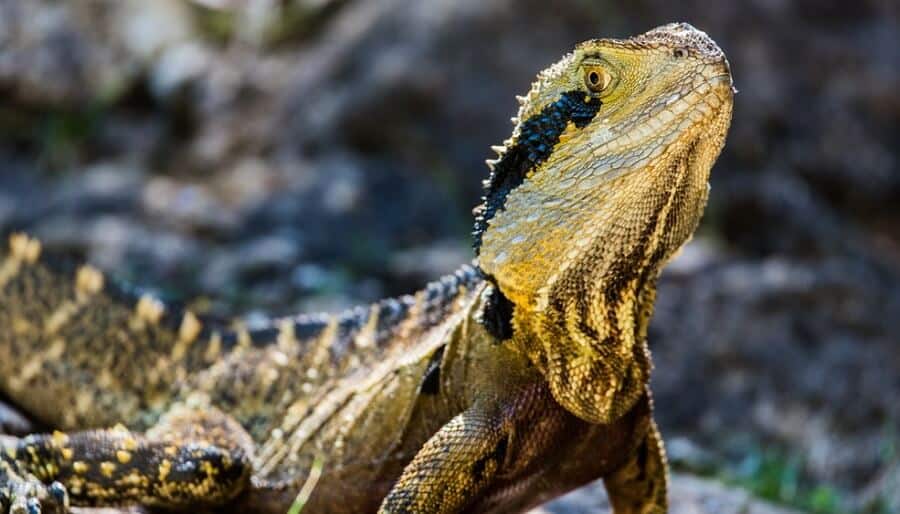
Are Lizards Poisonous?
Most lizards are not dangerous to people. There are only two dangerously poisonous lizards in North America: The Gila Lizard and the Mexican Bearded Lizard. Both lizards can be found down into South America, particularly Brazile.
Europe doesn’t have any dangerous poisonous lizards that are native to it.
Africa and Australia may contain some very localized lizards that have small amounts of poison.
While other lizards may have venom, they are not dangerous to people. It’s only been recently that Australian researchers have identified venom in other types of lizards. Bearded lizards, Komodo dragons, and even the gecko lizard produce small amounts of venom that is used to kill their prey.
However, they are unable to produce enough venom to hurt humans. In a worst-case scenario, their bits causes small amounts of swelling in the area.
Plus, lizards are generally mild-mannered and won’t attack unless they feel threatened. Even then, they usually use other methods to get away before biting.
Frequently Asked Questions:
How do I keep lizards off my porch? Keep lizards off your porch by maintaining natural lizard repellents. Grow onions, garlic, lemongrass, or blueberries on your porch in containers. In the blueberries, keep coffee grounds on the top of the soil. Blueberries love this, but lizards hate it. Keep your porch clean of food waste, places where bugs congregate, and other areas that attract bugs.
How can I keep lizards out of my yard? Keep lizards away from your yard by creating an environment that’s uninviting to them. Certain plants are smelly and foul to lizards and can help to keep them away. These plants include peppermint, eucalyptus, and pencil trees. Additionally, in the garden, onions, garlic, and lemongrass can help to keep lizards away.
Do lizards bite? Lizards can bite when they feel frightened or stressed. Most lizard bites are not poisonous, but they can be painful. In some situations, an individual may have an allergic or other reaction to the saliva or germs that are introduced by a lizard’s bite.
Why do I have so many lizards in my house? If you have many lizards in your house, it’s because they have been attracted to your home. Either you, or a previous resident may have left food or animal food scraps. As small insects come into the home to eat the food, they attract lizards.
Lizards are attracted to homes because of water or food. Once inside, they usually find a more moderate temperature that they also like. Keep your house clean and be feed animals outside so food scraps are not accidentally deposited in your house.
Are lizards scared of lights? Lizards are not scared of lights and are attracted to it. Lights in a house can sometimes bring lizards inside. Lizards sense danger by tasting the air with their tongue. That’s why smells are usually effective in repelling lizards from an area.
